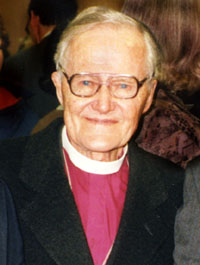(前編を読む)
ラウシェンブッシュの神学、そして楽観的なリベラル・プロジェクトは、第一次世界大戦と第二次世界大戦という悲惨な出来事と、新正統主義神学者からの鋭くはっきりとした批判により、一見すると信用されなくなった。しかしその後、復活している。それは皮肉なことに、新正統主義神学者のエミール・ブルンナーの著書『言葉と世界』(The Word and the World)にある言葉から始まったと言えるかもしれない。「燃えることによって火が存在するように、教会は伝道によって存在する」。言い換えれば、それが教会の目的であり、活力の元であり、世界中でその働きをすることなのだ。
[toggle]Rauchenbusch’s theology, and the entire optimistic liberal project, was seemingly discredited by the disasters called World War I and World War II and the incisive and bold critiques of neo-orthodox theologians. But it has since been making a comeback. It may have started ironically enough with the neo-orthodox Emil Brunner, who in The Word and the World said, “the church exists by mission just as a fire exists by burning.” In other words, the purpose of the church, its very life blood, is its work in the world. [/toggle]前世紀の終わりに、偉大な教会指導者であり宣教学者であるレスリー・ニュービギンは、教会の伝道の目的を生き返らせた。ニュービギンは現代の福音派に深い影響を与えており、彼の考えは繊細かつ注意深く、また元気づけられる。宣教学者のウィルバート・シェンクによるニュービギンの考えの要約は、彼の読者の多くにも取り上げられている。
[toggle]At the end of the last century, the great church statesman and missionary theologian Lesslie Newbigin reinvigorated the missionary purpose of the church. Newbigin has been a deep influence on contemporary evangelicalism, and his thought is nuanced and careful, as well as invigorating. But missiologist Wilbert Shenk’s summary of Newbigin is what many of his readers have taken away: [/toggle]「……私たちは、伝道のために教会を開拓するよう求められています。……伝道は継子として扱われることが多く、場合によっては孤児として扱われることもあります。つまり、伝統的な教会学では、伝道にはページが割かれていませんでした。それでも教会は、イエス・キリストによる神の統治のしるしであり、世界中でその統治を目撃するための手段として定められました。伝道の目的を受け入れるのを拒む教会は、健全な教会ではありません。……私たちは現代の西洋文化において、伝道のために教会を取り戻すよう求められています」
[toggle]… we are being called to reclaim the church for its missionary purpose. … Mission is often treated as a stepchild or, even worse, in some cases an orphan. That is to say, traditional ecclesiology has had no place for mission. Yet the church was instituted by Jesus Christ to be a sign of God’s reign and the means of witnessing to that reign throughout the world. The church that refuses to accept its missionary purpose is a deformed church. … We are being called to reclaim the church for its missionary purpose in relation to modern Western culture. [/toggle]
レスリー・ニュービギン
先ほど述べたように、ニュービギンの神学はこれよりも大きいが、これは福音派の指導者に大きな影響を与えている。おそらくその代表的な例が、宣教運動と呼ばれるものだ。この運動と同様、まさにその用語自体がさまざまな方面から論争の的になっている。神の国の神学に対する新たな見解、すなわち、神の国に関する主イエスの説教を私たちの神学の中心にしようとする試みとしばしば組み合わされている。「教会の目的はこのように要約できる」と多くの牧師や神学者が言っていることを理解するために、伝道のさまざまな味つけやはっきりした強みを否定する必要はない。
[toggle]As I just noted, Newbigin’s theology is larger than this, but this is what has made a great impact on evangelical leaders. Perhaps the prime example is what’s called the missional movement. As with most movements, the very term itself is in dispute and comes to us in many colors. It is often combined with a fresh appreciation of kingdom theology, an attempt to let Jesus’ preaching about the kingdom of God become the hub of the wheel of our theology. We needn’t deny the many flavors of missional, or its obvious strengths, to grasp that for many pastors and theologians, the purpose of the church can be summarized like this (from a church blog I happened upon): [/toggle]イエスは復活し、初代教会を教育するのに必要な時間を過ごすために遣わされた。主イエスは、終末を迎えるまで聖霊に権限をお与えになり、使命を遂行するため、教会を派遣された。主イエスがこの世に送られたように、聖霊も送られ、同じように教会も派遣された。それゆえ教会は、「すべての国に弟子を作る」という使命を果たすため、三位一体の神によって派遣され、宣教的に存在している。教会が存在するところはどこであっても、教会は神の国のしるしであり、宣言なので、世界のために存在する。
[toggle]After Jesus was resurrected and after he had spent significant time schooling the nascent church, as He Himself had been sent, He sent His church on a mission, and sent the Holy Spirit to empower them for that task until the end of time, to the very ends of the earth. As Jesus was sent, and as the Spirit was sent, in like manner, the church has been sent. Therefore, the church exists missionally, sent by the triune God to carry out the mission of making disciples of all nations. Wherever the church exists, it exists for the sake of the world, as a sign and proclamation of the kingdom of God. [/toggle]特に福音派のサブカルチャーの中での私の歩みと読書を考えると、これは、今日における多くの伝道的思考を、福音派の正統的な表現としてほぼ完璧に要約しており、私の心を打つ。そのインスピレーションを与える価値のために──そしてこれは否定されたり侮辱されたりすることはない──結局、ラウシェンブッシュと同じように、教会の目的は次のように要約できる。「どこに教会が存在しようとも、それは世界のために存在している」
[toggle]Given my travels and readings especially in the evangelical subculture, this strikes me as a near-perfect summary of an evangelically orthodox expression of much missional thinking today. For all its inspirational value—and this is not to be denied nor denigrated—in the end, it reduces the purpose of the church in the same way as does Rauschenbusch: “Wherever the church exists, it exists for the sake of the world.” [/toggle]慎重な読者は、私が挙げたこれらのポイントを疑うだろう。私もこのアプローチは間違っていると思う。
[toggle]The careful reader will have suspected my point in rehearsing all this: I think this approach is mistaken. [/toggle]特に、二つの理由で。まず、これは教会の非聖書的な見方だからだ。そして、教会にとって不健康なダイエットをしているようだと私は思う。なぜなら、それは結局、私たちの活動中毒を助長するだけであり、私たちが神を求めることをより困難にするからだ。
[toggle]In particular, it is mistaken on two grounds. I believe it is an unbiblical view of the church. And I believe it is an unhealthy diet for the church. Why? Ultimately because it only encourages our addiction to activity and makes it ever harder for us to want to seek out God. [/toggle]次の2回で、このアイデアをさらに詳しく探っていく。
[toggle]I’ll explore this idea more in-depth over the next two weeks. [/toggle]執筆者のマーク・ガリは、クリスチャン・トゥデイの編集長。
本記事は「クリスチャニティー・トゥデイ」(米国)より翻訳、転載しました。翻訳にあたって、多少の省略をしています。

